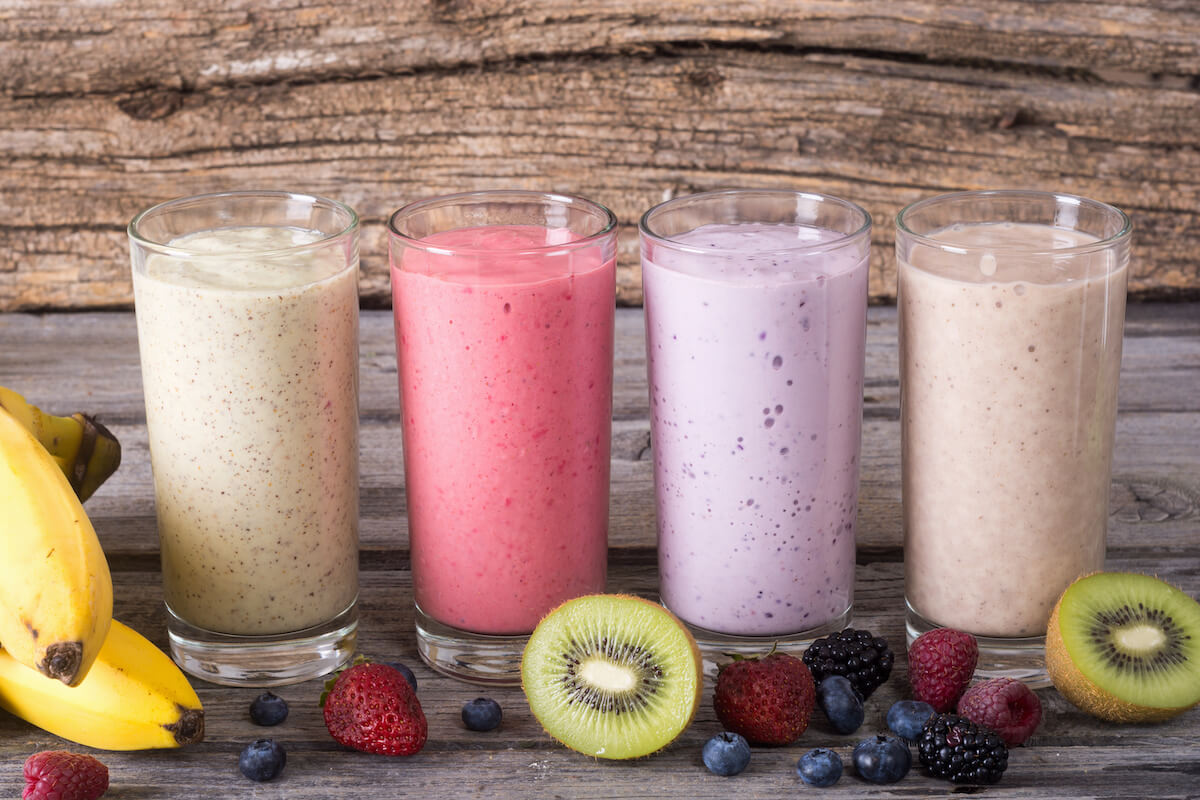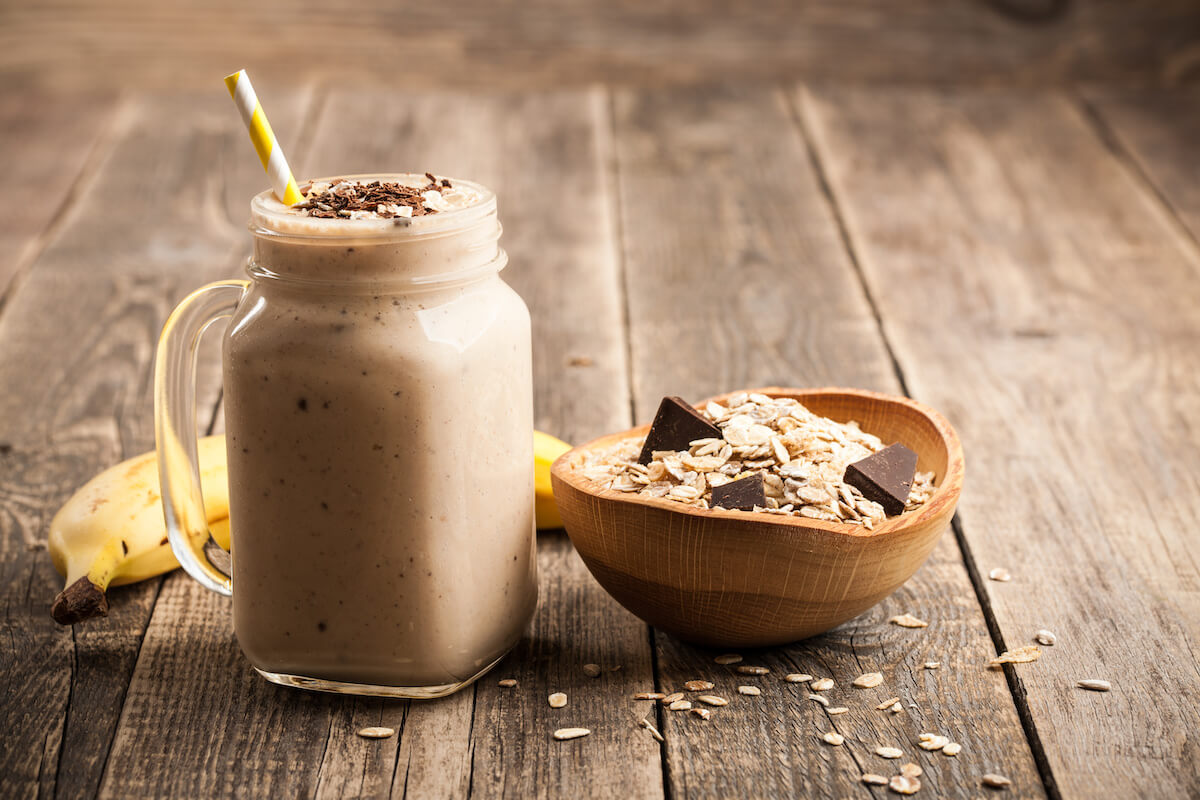
07 Jul Protein Shake for Breakfast: Good Idea or Bad?
Protein shakes are popular supplements for athletes and bodybuilders, but many others drink protein shakes as a meal replacement for breakfast. The question is: Are protein shakes for breakfast good for you? And why should you even have a high-protein breakfast? After all, a bowl of cereal or a piece of toast can seem a whole lot quicker and easier.
Let’s explore whether it’s a good idea to have a protein shake for breakfast — and if so, what kind of protein you should use. We’ll look at some benefits of having a protein shake as your first meal of the day, then share some great ideas that will have you looking forward to your high-protein shake every morning.
Why Protein?
Firstly, let’s tackle the question of why you need protein at all. Protein is one of the three vital macronutrients your body needs to function optimally. The other two are carbohydrates and healthy fats.
When you consume protein, your digestive system breaks it down into amino acids. These amino acids are then recombined and used to build muscle, bones, organs, and many other essential elements of your body. They also help keep your immune system strong so your body can fight disease.
The amount of protein you need depends on your age and activity level:
- The average person needs around 0.8 grams of protein per kilogram of body weight every day
- A mature person who wants to maintain muscle mass needs around 1.5 grams per kilogram
- An athlete or bodybuilder aiming to maintain or build muscle mass needs at least 2 grams per kilogram
It can be difficult to get that much protein from food alone, even if you’re moderately active. After all, there’s only so much food you can chew. Having a protein shake for breakfast helps you increase your protein intake in an easy, healthy, and delicious way that sets you up for the day. It’s also quick, portable, and customizable to your taste and health goals.
Note that if you have a health condition of any kind, it’s important to consult a registered dietitian or another health professional before adding extra protein to your diet.
Benefits of Protein Shakes for Breakfast

A protein shake for breakfast has numerous health benefits, whether you’re an athlete or bodybuilder — or not. It supports general wellness on many different levels:
Builds Muscle
One of protein’s primary roles is building and maintaining muscle. That’s why many athletes and bodybuilders who want to increase muscle mass have a pre-workout or post-workout protein shake. As we’ve mentioned, even the average person needs to ensure they’re getting enough protein for muscle growth. Strong muscles help you with everyday tasks like lifting your children, carrying your shopping bags, and walking up a flight of stairs.
Manages Blood Sugar Levels
Protein helps to stabilize your blood sugar over the course of the day. This prevents dips that can create cravings and fatigue or blood sugar spikes that can cause headaches or frequent urination.
Supports Weight Loss
If your goal is reducing body weight, replacing your regular breakfast with a protein shake is a great idea. Protein takes longer to digest than carbohydrates and promotes satiety. It helps you feel full for longer, reducing your desire to snack between meals, and as a bonus, it can boost your metabolism.
Protein also gives your body many nutrients you need without increasing the calories you take in by too much, which is critical for fat loss. Of course, you still need to watch your calories for the rest of the day and get plenty of exercise, but having a protein shake for breakfast is a good start.
Now that you know why protein shakes are so good for you, let’s look at how to build the perfect protein shake for breakfast, starting with the protein powder you use.
The Best Protein Powder for Your Protein Shake
There are many different protein supplements out there. To choose the right type of protein, consider what you’re trying to achieve with your protein shake for breakfast.
Fast-digesting whey protein isolate or concentrate is an excellent option for breakfast, especially if you plan to do a workout in the next couple of hours (although you can have your protein shake anytime that day).
Make sure you’re getting everything you should be from your whey protein supplement by choosing a high-quality brand like Ingredient Optimized ioWhey Protein. It’s proven to be more bioavailable than non-optimized protein powder and better at building muscle and strength and helping with recovery. You can find it in these partner products:
For a slower and more sustained release of amino acids throughout the day, casein is a better bet. It doesn’t give you the same instant boost as whey, but it keeps you going (and feeling full) for longer.
Pea protein is a good choice if you’re following a plant-based diet or can’t tolerate lactose. It’s often combined with other plant proteins, like rice or hemp, to compete with the benefits of whey. Available for the first time, there’s a pea protein that is as beneficial as whey protein powder. Look out for Ingredient Optimized ioPea Protein in these partner products:
What to Put In Your High-Protein Smoothie

You can, of course, buy a pre-made protein shake for breakfast. If you do, watch out for hidden sugars and other undesirable ingredients. There are also many delicious protein shake recipes online, but you can just as easily create your own by combining carbs, protein, and healthy fats with your choice of fruit and vegetables.
Including fruits and vegetables boosts your intake of nutrients like vitamins, minerals, antioxidants, and fiber. That said, you shouldn’t replace all your meals with protein shakes, or you’ll put yourself at risk of nutritional deficiencies. Make sure you eat solid food for your other main meals.
Let’s look at the building blocks of a smoothie.
Base Liquid
Depending on what you choose, your base liquid can add nutrients, and it also helps to blend your breakfast shake into the right consistency to drink. The base could be any liquid really, for example:
- Greek yogurt (a great source of protein and healthy fats)
- Kefir
- Coconut milk
- Coconut water
- Almond milk
Protein Powder
Your body can process about 0.25 grams of protein per kilogram of body weight at one meal. Read the instructions carefully to check how much is in one serving of the supplement you’re using, and adjust accordingly.
You can get supplements in different flavors, like chocolate, strawberry, or vanilla protein powder, which gives you a base flavor right off the bat.
Carbs
If you’re working out that day, don’t be tempted to skip the carbs in your protein shake. Those carbs get converted to glycogen, which your body needs to help you power through your training session. If your goal is to lose weight, you may want to moderate the carbs (and high-calorie fats), but you still need some.
The amounts you need may vary but these carbs work well in a protein shake for breakfast:
- Oats
- Quinoa, which is also high in protein
- Fruit like bananas, kiwis, strawberries, or blueberries
- Veggies like zucchini, beetroot, spinach, or Swiss chard — or try a green powder to get extra nutrients without dealing with the vegetables directly
To save time, cut up the fruit and veggies you plan to use for the next few days in advance, then keep them in handy portions. You can freeze it if you like — the texture won’t be the same, but that won’t matter since it’s blended anyway.
Healthy Fat
Your body needs a certain amount of healthy fat to function properly. Fat (and protein) also help to slow down the absorption of carbs, so you don’t get a blood sugar spike.
Add 10-20 grams of healthy fat (on the lower side if you’re trying to lose weight). For example:
- Peanut butter or another nut butter, like cashew, macadamia, or almond butter
- Seeds like sunflower, flax, and chia seeds
- Avocado
- Coconut or pure MCT oil
- Flax seed oil for some extra omega-3s
Fats like avocado and Greek yogurt also add a delicious creaminess to your protein shake for breakfast, making it extra satisfying.
Sweeteners
If you’ve used fruit, you may not need any extra sweetness. If you need more, try stevia or monk fruit as low-glycemic options.
Bonus Ingredients
These ingredients add a little something extra:
- Cocoa powder for a chocolate flavor (assuming you’re not using a flavored protein powder) — or even better, raw cacao for a kick of flavor and a dose of antioxidants
- Vanilla or almond essence for flavor
- Cinnamon or ginger for flavor plus extra nutrients
Should You Have a Protein Shake for Breakfast?

Yes, a protein shake for breakfast is a very good idea for most people. It will help you build and maintain muscle for everyday tasks, and it’s especially important if you’re an athlete or bodybuilder. It also helps balance your blood sugar and supports fat loss — if that’s your goal.
Tailor your breakfast shake according to your health goal, and include all the macronutrients: protein, carbs, and healthy fats. Fruit and veggies are an excellent addition to give you an extra dose of nutrients. Make your smoothie as delicious and nutritious as possible, so you look forward to it every morning — your body will thank you.


